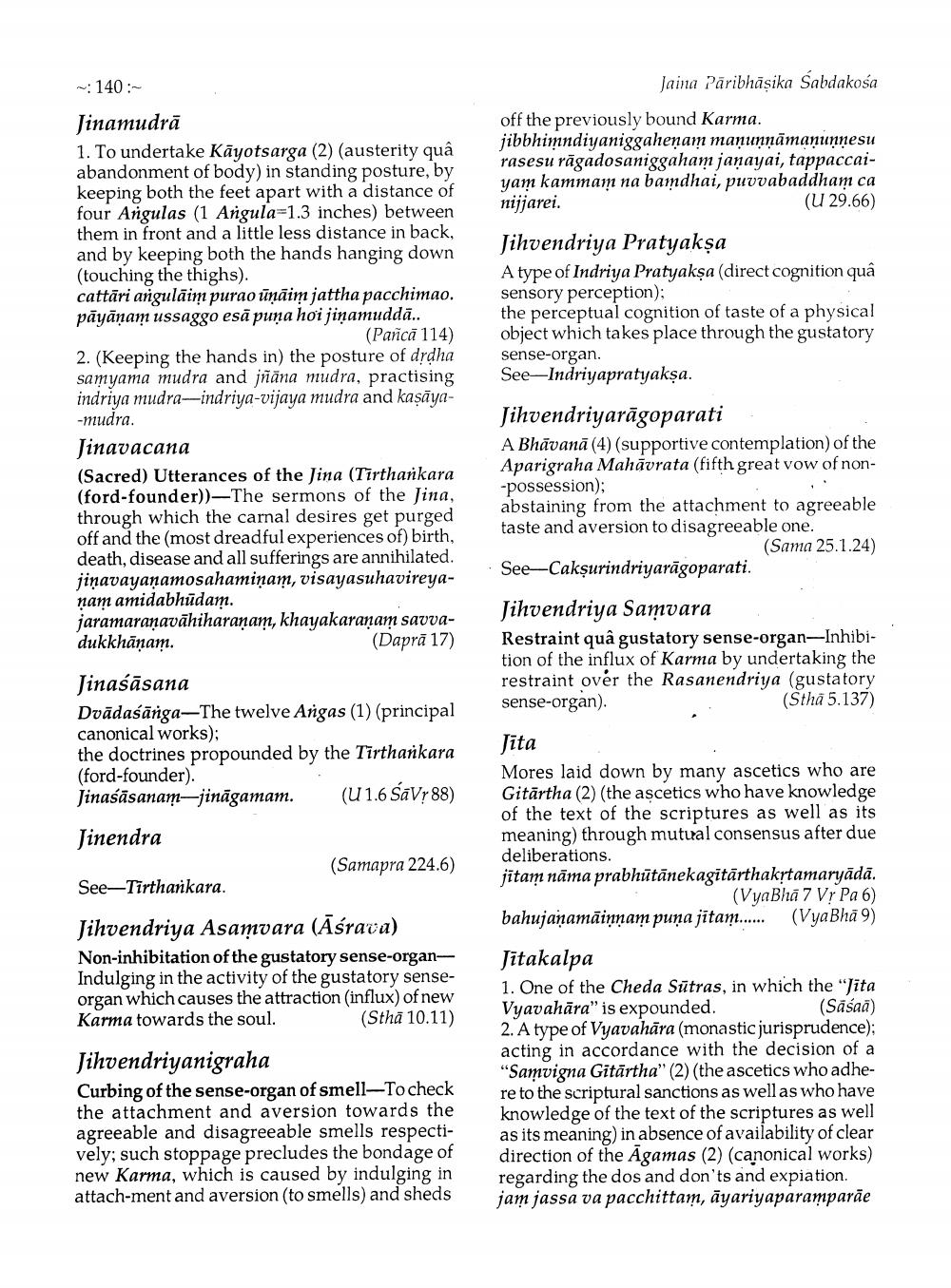________________
140 :Jinamudrā 1. To undertake Kāyotsarga (2) (austerity quâ abandonment of body) in standing posture, by keeping both the feet apart with a distance of four Argulas (1 Angula=1.3 inches) between them in front and a little less distance in back, and by keeping both the hands hanging down (touching the thighs). cattāri angulāim purao ūņāim jattha pacchimao. pāyānam ussaggo esā puna hoi jiņamuddā..
(Pañcā 114) 2. (Keeping the hands in the posture of drdha samyama mudra and jñāna mudra, practising indriya mudra-indriya-vijaya mudra and kaşaya-mudra. Jinavacana (Sacred) Utterances of the Jina (Tirthankara (ford-founder))-The sermons of the Jina, through which the carnal desires get purged off and the (most dreadful experiences of) birth, death, disease and all sufferings are annihilated. jiņavayaņamosahamiņam, visayasuhavireyaņam amidabhūdam. jaramaraņavāhiharaṇam, khayakaraṇam savvadukkhānam.
(Daprā 17)
Jaina Pāribhāṣika Sabdakosa off the previously bound Karma. jibbhimndiyaniggahenam maņunnāmaņunnesu rasesu rāgadosaniggahamjanayai, tappaccaiyam kammam na bamdhai, puvvabaddham ca nijjarei.
(U 29.66) Jihvendriya Pratyakşa A type of Indriya Pratyakşa (direct cognition quâ sensory perception); the perceptual cognition of taste of a physical object which takes place through the gustatory sense-organ. See—Indriyapratyakşa. Jihvendriyarāgoparati A Bhāvanā (4) (supportive contemplation) of the Aparigraha Mahāvrata (fifth great vow of non-possession); abstaining from the attachment to agreeable taste and aversion to disagreeable one.
(Sama 25.1.24) See--Cakşurindriyarāgoparati.
Jihvendriya Samvara Restraint quâ gustatory sense-organ-Inhibition of the influx of Karma by undertaking the restraint over the Rasanendriya (gustatory sense-organ).
(Sthā 5.137)
Jinaśāsana Dvādaśānga-The twelve Argas (1) (principal canonical works); the doctrines propounded by the Tirthankara (ford-founder). Jinaśāsanam—jināgamam. (U1.6 ŚãV188)
Jinendra
Jita Mores laid down by many ascetics who are Gitārtha (2) (the ascetics who have knowledge of the text of the scriptures as well as its meaning) through mutual consensus after due deliberations. jitam nāma prabhūtānekagitārthakytamaryādā.
(VyaBhā 7 Vr Pa 6) bahujaņamāinnam puņa jitam...... (Vyabha 9)
(Samapra 224.6)
See-Tirtharkara.
Jihvendriya Asamvara (Aśrava) Non-inhibitation of the gustatory sense-organIndulging in the activity of the gustatory senseorgan which causes the attraction (influx) of new Karma towards the soul. (Stha 10.11)
Jihvendriyanigraha Curbing of the sense-organ of smell-To check the attachment and aversion towards the agreeable and disagreeable smells respectively; such stoppage precludes the bondage of new Karma, which is caused by indulging in attach-ment and aversion (to smells) and sheds
Jitakalpa 1. One of the Cheda Sūtras, in which the "Jita Vyavahāra" is expounded.
(Sašaā) 2. A type of Vyavahāra (monastic jurisprudence); acting in accordance with the decision of a "Samvigna Gitārtha" (2) (the ascetics who adhere to the scriptural sanctions as well as who have knowledge of the text of the scriptures as well as its meaning) in absence of availability of clear direction of the Āgamas (2) (canonical works) regarding the dos and don'ts and expiation jam jassa va pacchittam, āyariyaparamparāe




